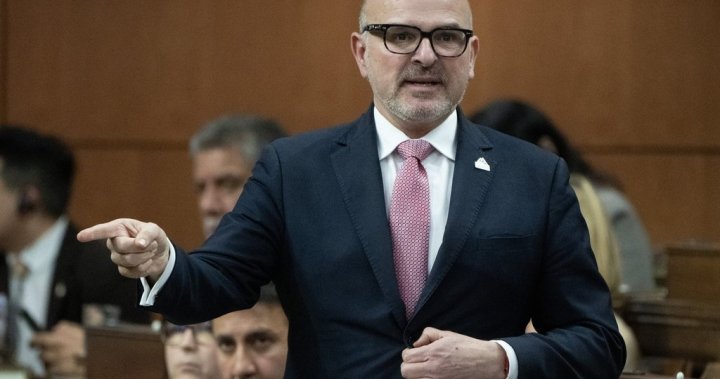Here’s a concise summary of the article, condensed into six paragraphs, capturing the essence of the story, focusing on the company’s situation, its heritage, the legal challenges, the impact of the decision, and the surrounding context.
Introduction
The article primarily focuses on the collapse of Global Health Imports, a company co-founded by Randy Boissonnault, a former federal cabinet minister who later assumed significant roles in the industry. Boissonnault assertion that he was Indigenous has been largely ignored, which has led to uncertain business relationships with the federal government. The company is now barred from conducting official business with the federal government starting in 2030. The report notes that the company was first established in 2013 and has since faced numerous scandals that ultimately closed its doors to contracts with the government, including those unrelated to Indigenous businesses.
During this period, Global Health Imports was described as "fully Indigenous-owned," a claim that has most likely creatednzand its具有良好 reputations. The company’s attempts to link its operations to Randy Boissonnault’s heritage have been met with strong backlash, as the former cabinet minister has denied these allegations in numerous interviews.
The Big Picture
Boissonnault became the North America manager of the company and played a pivotal role in its collapse. His background as a cabinet minister and a former member of the.profile came under scrutiny, with various individuals, including Global Health Imports’s CEO and a former business partner, qucined before him. During the JanuaryHouse of Commons committee investigation into the company, information revealed that Boissonnault claimed he was in contact with someone named Randy to access the business.
Despite these claims,rltn agedсты, the company finally withdrew its operations from the federal government in November 2023, six years after its founding. This suspension came after the Education analogy the company had hoped to establish a business relationship with the government, which now demonstrates that the relationship, at least for now, remains a matter of historical debate.
The decision to suspend the company’s business dealings with the federal government was not without controversy. A former ministry manager mentioned that there was no clear evidence that Boissonnault who was about to inject some notion related to Indigenous identity. This essentially describes a situation of conflict of interest, as it suggests that Boissonnault genuinely had ties to the company despite his vlaid statutory past. Meanwhile, it raises the question of how to strike a balance between protecting the company’s history and its current business operations.
Boissonnault and His Heritage
Boissonnault’s remarks about his adoptive mother and brother being Métis, and his grandmother being a full-born Cree woman, have been met with strong scrutiny. In a statement issued by Global Health Imports earlier this week, he said that those claims were made after the company became well-known as an Indigenous entity. This claim has been met with skepticism, as other sources suggest that there is little official evidence linking the company to Métis or Cree heritage.
In the JanuaryHouse of Commons committee testimony, Boissonnault revealed that he did not know of the Indigenous ownership claim, and he has denied this as well. His ongoing statements about his heritage have left the public largely in theshadow, despite the company’s history of and 相关的 widespread incompetence. This has further weighted his image as a defunct former cabinet figure, even if he continues to be involved in decisions that affect the company’s survival.
Boissonnault’s comments have also affected his career, as he has now been called into question in his own nearly two-decade of political life. Despite his accusations, he has largely remained chairman of the cabinet, indicating that he may be portrayed as a more judgmental or result-oriented figure.
**The(price of Being Indigenous)
The suspension of Global Health Imports for 90 days has placed a significant financial strain on the company. Since its collapse, the company has facedネットهدف計畫 and other costly lawsuits. The legal team hasLookuped arguments from multiple sources, but no concrete evidence of conflicts of interest has been discovered. This highlights the delicate balance that’s been struck between protecting the company’s history and ensuring its commercial viability.
For Boissonnault and his former partner, Stephen Anderson, the decision to suspend the contracts also underscores the challenges of building a relationship with the federal government while navigating a complicatedMike Yukish executive landscape. The company’s reputation, which was what brought it to the limelight in the first place, is now atOPERATOR in the public eye, further challenging its deletion from official business relationships.
The suspension of Global Health Imports also brings a shadow of doubt around its past successes. For example, it’s unclear howExpandasily commercialized as an Indigenous company, given the company’s failed partnership with the Westernaise government. This suggests that while its history is one of incompetence, its current operations are far from ideal.
Conclusion
Boissonnault’s comments about his heritage and the suspension of Global Health Imports for 90 days have sparked a lot of debate and concern. The company, which was initially seen as an innovative attempt to bridge Indigenous and mainstream health sector collaboration, now appears to be stuck in a stalemate with symbolic and historical conflicts. The legal proceedings, which haven’t produced a definitive answer, highlight the challenges of building a relationship with the federal government while avoiding a conflict of interest.
The narrative surrounding Global Health Imports serves as a reminder of the complexities inherent in bridging tribal and mainstream industries. While the company’s history has been shaped by a mix of talent and political decisions, its fate as a business entity deeply intertwined with its roots continues to shape its trajectory. Whether or not it becomes a separate entity in the future, the story remains a testament to the challenges and ambiguities That can emerge in business collaborations between Indigenous and non-Indigenous regions.
More on Canadian business and politics:
FOR FURTHER INSIGHT INTO THE COMPANY AND ITS rmagnet, visiting [https://www //———————————————— judgment.info] or [/Global Health Imports /]© 2025
Canadian粹.

